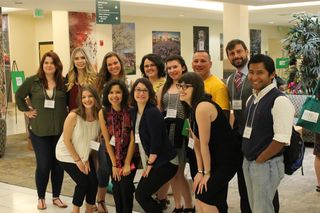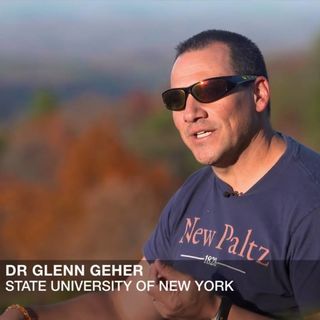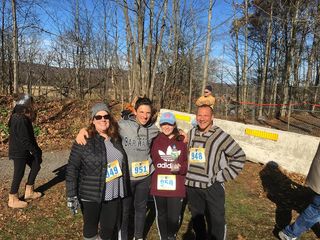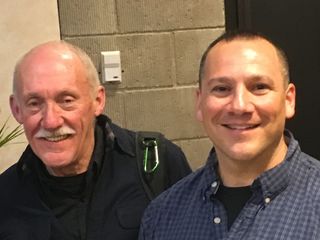Psychology
Back Pages of an Evolutionary Psychologist
An interview with The Native Society.
Posted December 11, 2017
A few weeks ago, I was contacted by Oliver Estreich of The Native Society, which focuses on "inspired thought leadership with a positive perspective." Their website has interviews and bits of wisdom from people including Jimmy Wales (Founder of Wikipedia), Carolyn Kylstra (Editor in Chief of Self Magazine), Donna Karan (Founder of DKNY), and many more. So when I was contacted to provide an interview for them, I'm thinking, "I have no idea what rock you turned up and found me under, but I'll take it!"
I think it came out alright and thought my readers here at Psychology Today might appreciate it. Below, I give you Back Pages of an Evolutionary Psychologist.
***
What do I do best?
I do a lot of things in my work life and beyond. Writing, speaking, conducting research, developing curriculum, training for marathons, hiking high peaks in mountains across the nation, and more. But the thing I do that, to me, has the biggest effect pertains to motivating students to believe in themselves and to achieve.

My own history as a student has helped me create an approach to dealing with students where I truly believe in the capacities of my students. When I was a high school student in New Jersey in the 1980s, I was far from the best student going. I graduated with a GPA in the low B range — and was barely in the top 100 of my (small) graduating class. I was, to be honest, something of a goof-off! The road from that starting point to becoming a successful academic with a Ph.D. and over 100 publications was uphill, to say the least!
By some small miracle, I was admitted into the University of Connecticut. I still will never understand why. My first two years were pretty ho-hum (including a well-deserved D in English Literature!). In any case, by about my junior year, I came to realize that if I worked really really hard, I could do very well in my classes. It was a simple formula. And I found that I was passionate enough about studying scientific psychology to care. So I turned up the studying.
I did well enough to get into a Ph.D. program in psychology, all tuition waived, at the University of New Hampshire. Even then, I had to work uphill a bit. All other members of my cohort came from prestigious schools from around the country — and most of them seemed so serious about their studies — and they all appeared super-smart! I still had some growing to do.
Well, by about the third year of the five-year program, I ramped things up quite a bit. I ended up being the first of my cohort to defend their dissertation — and the first one to be offered a tenure-track job. And I’ve done reasonably well from that point moving forward (and am now a reasonably well-published full professor at a major state university — twice awarded for excellence by the SUNY Chancellor).
From this background, I learned that hard work and passion for the material can bring a ho-hum student just about anywhere — and it is this philosophy that I bring to my students at SUNY New Paltz. I love that I teach at a public institution, because the students often remind me of younger versions of myself.
At any given point, I surround myself with students who express an interest in learning more about the research I do in evolutionary psychology. And I am usually pretty generous with letting them into the New Paltz Evolutionary Psychology Lab, which I direct. I take undergraduate students, graduate students, and sometimes the ambitious local high school student onto the team. And I tell them that the sky is the limit, and we can conduct research on pretty much any question related to the behavioral sciences that we want to. And my students know that I will support them fully.
This approach has been successful. I’ve had more than 100 instances of student co-authors on my articles, chapters, and books. In fact, two of my books are co-authored by former students of mine (both with Oxford University Press, so these are not rags by any means). And my students have gotten into graduate programs at such schools as Columbia, NYU, Binghamton, University of Florida, New Mexico State University, Brunel University, and more.
Hey, if I did it, then you can do it too! And I’m here to help you every step of the way. That’s the attitude that I bring to my mentorship with students. I guess this is what I do best!
What makes me the best version of myself?

I would have to say that I am relentless. Also, I like to use a phrase that I learned from the few years I lived in Oregon, where it rains most days of the year. I guess that can get pretty old. But there’s a phrase that the folks out there have, which is this: Smile at the rain. I rather like that — and I think that I apply this approach to everything I do.
When I was in my 20s, I started long-distance running. A good friend of mine at the time suggested that I train for a marathon. So I did. And I was impressed by myself. Not by my performance in the race or my mediocre speed. No, I was impressed that I had what it took to effectively train for the marathon. That took an extraordinary amount of dedication and effort. I have run 10 more marathons since, including one just last month, in fact!
I’d say that this combination of relentlessness and resilience really has helped me achieve quite a bit. These traits also allow me to effectively deal with failure. People who know me are often surprised when I tell them that I actually deal with failure quite often. For instance, I will probably get up to 10 rejection letters a year regarding papers that I have submitted for publication!
This past year, I ran into a huge instance of failure: I ran for a local governmental position (County Legislator). I put more time into that campaign than into pretty much anything I have ever done in my life. And let’s just say that I didn't win. A few people, knowing how much I put into the campaign, seemed worried for me. But you know, I actually bounced back pretty quickly from that. Disappointed? Sure. Deflated? Nah! Just another opportunity to smile at the rain, learn some new lessons, and move forward.
What are my aspirations?

Personally, I want to maintain my close connection with my family. I have a wife (Kathy) and two kids (Megan, 17, and Andrew, 14), and we are very close. Watching my kids develop and helping them thrive along the way is a major goal of mine each and every day. My wife and I work together and devote as much time as we can to raising our kids and having fun as a family. I would not trade this for anything and in the foreseeable future, I aspire to stay connected to my kids as they transition from the high school years to the next stage.
I also aspire to stay close to my extended family, now spread out across the nation. This proves to be tricky at times, given constraints on time and resources. But as I grow during this life stage, it becomes more and more clear to me that that life is precious, and that it goes quickly. And you only get one shot at it. At the end of the day, connections with kin are foundational for living a rich life.
In terms of my work, I want to continue to (a) help students grow, (b) publish scholarly works that provide new insights into the human condition, (c) contribute to the work of the NorthEastern Evolutionary Psychology Society (NEEPS), a student-friendly, international organization that I founded in 2007, and (d) help advance evolution education in general, on my home campus and beyond.
My Biggest Success?
I have done a lot in my career, but I’d say that my biggest success is the NorthEastern Evolutionary Psychology Society (NEEPS), which I founded over a decade ago. Early in my academic career, I discovered that the academic field I was most passionate about, evolutionary psychology, is apparently controversial — and some folks even on my own campus tried to stop classes on this topic from being taught!
Well, I’m a big fan of making lemonade when you get lemons, so I kicked it into high gear and worked with a group of students from my own campus, as well as faculty and students from campuses around the Northeast, and in 2007, we held the first-ever meeting of the NorthEastern Evolutionary Psychology Society. It was a huge success right off the bat, drawing scholars from at least three nations and dozens of states. Now entering its 12th year, NEEPS is a thriving society, with its own journal published by the American Psychological Association, a highly successful annual conference, dozens of examples of student members getting into graduate schools and academic jobs, and an international reputation as the second-largest intellectual society on the topic of evolution and behavior worldwide. Each year, my students at New Paltz and I play a major role in helping organize the NEEPS conference, and, I have to say, it is a blast!
My Most Challenging Moment?
In about 2003, I proposed a new class called “evolutionary psychology” to be taught at SUNY New Paltz. I was surprised to get intensive pushback on this. I was a new faculty member proposing a highly legitimate class that I was passionate about. I was not amused. The psychology department faculty took hours of agonizing meetings to end up approving this class — by a split vote! Wow, this was not exactly pleasant for me.
At that point, I had a few choices. I could have said “forget this place” and applied to other jobs. But you know, by the point, my wife was pregnant with our second kid, and we owned a great house and had a strong social network. We weren’t moving! I could have changed my area of scholarly inquiry… yeah, right, like THAT was going to happen! Or I could do what I did: I smiled at the rain on this one.
I was not going to let some cranky naysayers keep me down. Not only did I develop the class, which is now taught regularly in our department, but, as I mentioned previously, I started an entire intellectual society dedicated to the field of evolutionary psychology — with New Paltz as the informal home of NEEPS. And that’s not all. I also spearheaded the creation of an interdisciplinary program in Evolutionary Studies (EvoS) here at New Paltz, and have been teaching in that highly successful program for over a decade now. Further, I wrote a highly cited article called “Evolutionary Psychology is Not Evil… And Here’s Why!” — an article that was republished in the Taking Sides in Psychology book, which is assigned to thousands of introductory psychology students each year. I also wrote Evolutionary Psychology 101 for Springer publication’s highly renowned Psychology 101 series. As you can see, I was resilient and relentless. Failure was not an option!
My Motto?
Smile at the rain. Oh, and move forward!
At the end of the day, you’re going to run into all kinds of problems, hurdles, and stressors. Keep it all in perspective, and remember that any given problem you encounter, no matter how big it may seem at the time, is only a battle in the larger war. Smile at the rain — and move forward.
My Favorite People/Role Models?

One of the most inspirational people to me is Dr. Gordon Gallup of the University at Albany. Gordon recently retired from a storied career, where he garnered over 300 scholarly publications, produced dozens and dozens of high-quality Ph.D. graduates, and was just a stand-up guy throughout. This is a guy who has about as much pretense as a Chevy pickup — he is genuine, honest, accessible, and never talks down to anyone. And I have to say that this is a welcome change from what you often see of folks in academia. On top of that, he has a heart of gold — and he has worked just as much to support his students on their academic paths as he has to conduct world-class research on questions into human nature. Alumni of Gordon always light up when his name is mentioned — and for good reason.
My Favorite Places/Destinations?
Give me an awesome out-of-doors experience, and I’m happy just about anywhere! Whether it be hiking in our local mountains, the Shawangunks, or hiking the high peaks of New Hampshire and Maine, I just love a good patch of mountainous wilderness. I also am very fond of the water and am happy as a clam kayaking in Florida’s intracoastal waters or in Frenchman’s Bay in Maine. I have also hiked in California’s canyon country and in the Cascades of Oregon. I am a huge outdoor enthusiast, and I truly believe that there are beautiful places all across the world.
My Favorite Products/Objects?
Ha — this one is a funny one for me! I am so anti-materialistic it’s ridiculous. I’m not into gadgets or fancy cars or fancy computers or much else, really. I’m a big believer that living the good life is living one that is full of love and rich in experience.
This said, I am nothing without my Saucony Grids! These are running shoes that fit my feet and running style really well. During marathon training season, I might run up to 150 miles in a month, and it really does help to have the right shoes!
My Current Passions?
Questionable Authorities! In case you don’t know what that is — and you probably don’t — that's the name of the band I’m in. We are an all-professor punk rock band comprised of one biologist, three sociologists, and myself, a psychologist. I play lead guitar. And we mostly play older cover songs by bands such as the Rolling Stones, Doors, Violent Femmes, Green Day, and more! We have a ton of fun, and we play out in the bars in town about twice a semester. Next time you're in New Paltz, New York, after 11 p.m. or so, stop by Snugs on Main Street, and you just might catch us!
***
Note that this post is adapted from an interview found here (with written consent of The Native Society).




